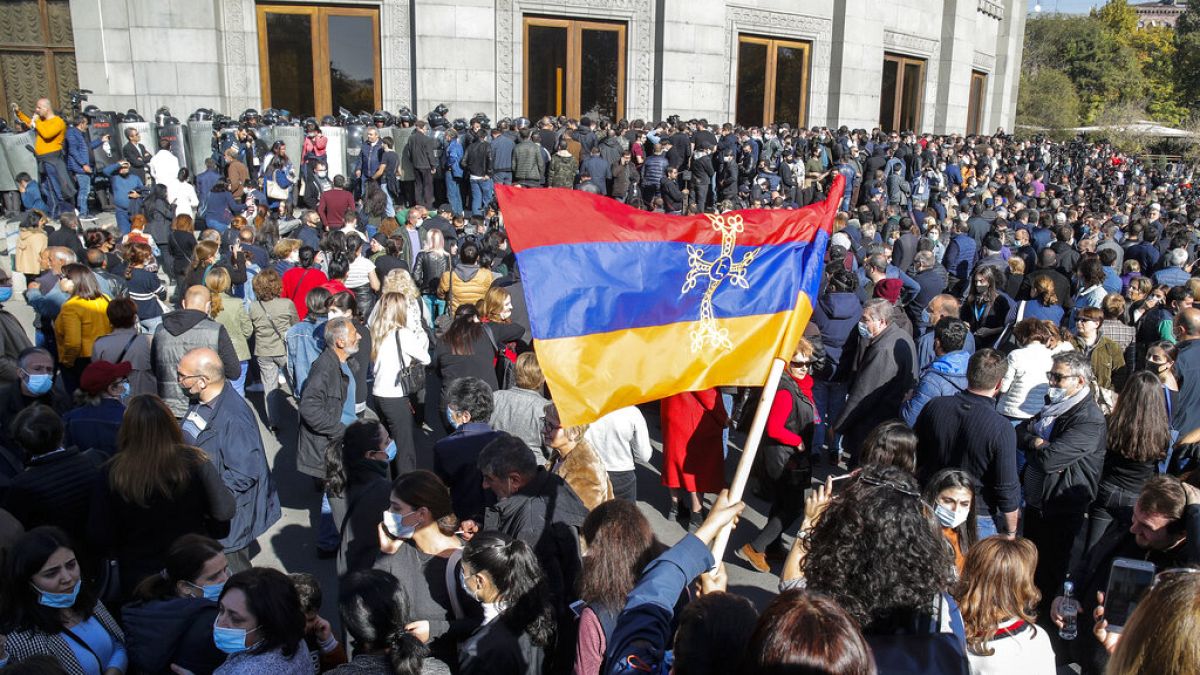Nikol Pashinian says other towns in the region could have been seized by Azerbaijan if he had not accepted the Russian-brokered agreement
Armenia's prime minister Nikol Pashinian defended an agreement to halt fighting with Azerbaijan in Nagorno-Karabakh, saying the deal had prevented other cities from being seized.
Speaking on Wednesday, he said the region's largest city Stepanakert — known to Azerbaijanis as Khankendi — had been among those at risk of falling after the main supply road from Armenia was cut off.
"If hostilities continued, there was a very high probability that Stepanakert, Martuni, Askeran would have been captured, after which our second, third, fourth, fifth, sixth defensive areas would be under a blockade, and thousands of our soldiers would also be under a blockade," Pashinian said.
But protesters were on the streets of the Armenian capital Yerevan for a fourth successive day on Wednesday demanding the prime minister's resignation.
Several demonstrators were detained by police and security forces.
Meanwhile in Baku, there were scenes of celebration earlier this week, with the streets of the Azerbaijani capital were rammed with traffic, and people danced on cars, waving the flags of both Azerbaijan and Turkey.
Armenia 'has been sold out'
The agreement to stop fighting, which took effect earlier this week, calls for the deployment of nearly 2,000 Russian peacekeepers, as well as territorial concessions.
In all, 1,960 Russian peacekeepers will be sent to the region under a five-year mandate.
Russian President Vladimir Putin said in a televised address that the peacekeepers would be deployed to patrol frontlines.
But many Armenians remain angry at what they perceive to be a defeat in the conflict.
Journalist Jack Losh, who is in Yerevan, told Euronews spoke an orthopaedic doctor volunteering at a hospital in the city Stepanakert/Khankendi.
"He told me was that carrying [out] ten to eleven amputations per day from soldiers and civilians alike who were getting wounded in the artillery fire," Losh said.
"He told me: 'we Armenians are stuck in a game between the great powers. We've lost out and we have been sold out.'"
Georgia 'feeling the pressure'
Emil Avdaliani, an academic at the European University in Tbilisi, warned mainly people in neighbouring Georgia were concerned about Russia's growing influence in the southern Caucasus.
"One country which feels particularly uneasy about this is of course Georgia," he told Euronews on Wednesday.
"With two military bases on Georgian soil now, basically everyone from the Georgian political establishment and among the analysts too, they see that Russian influence now in the region will be increasing rather than declining.
"So the country is feeling pressure, feeling the increase of Russian influence now around its borders.


